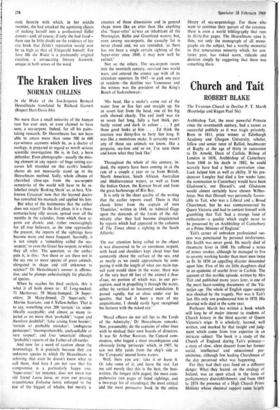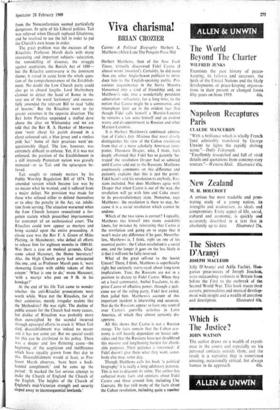Church and Tait
ROBERT BLAKE
The Victorian Church in Decline P. T. Marsh (Routledge and Kegan Paul 56s) Archbishop Tait, the most powerful Primate since the seventeenth century, had a career as successful publicly as it was tragic privately.
Born in 1811, prize winner at Edinburgh Academy and Glasgow University, scholar, fell'ow and senior tutor of Banjo], headmaster of Rugby at the age of thirty in succession to Dr Arnold, Dean of Carlisle, Bishop of London in 1856, Archbishop of Canterbury from 1868 to his death in 1882, be could scarcely have had a better curriculum vitae. Luck helped him as well as ability. If his pre- decessor Longley had died a few weeks later, the nomination to Canterbury would have been Gladstone's, not Disraeli's, and Gladstone would almost certainly have chosen Wilber- force. Not that Disraeli was personally favour- able to Tait, who was a Liberal and a Broad Churchman, but he was outmanoeuvred by Queen Victoria and had to content himself with grumbling that Tait 'had a strange fund of enthusiasm—a quality which ought never to be:possessed by an Archbishop of Canterbury or a Prime Minister of England.'
Tait's, career of unbroken professional suc- cess was punctuated by personal misfortunes. His _health was never good. He nearly died of rheumatic fever in 1848. He suffered a series of minor strokes, although he managed to live to seventy working harder than most men twice as fit. In 1856 an appalling disaster descended upon him. Five of his six little daughters died in an epidemic of scarlet fever in Carlisle. The - account of this terrible episode, written by Mrs Tait and published many years later, is one of the most heart-rending documents of the Vic- toman age. The whole of English upper society was shocked by the tragedy. Nor was it Tait's last. His only son predeceased him in 1878. His devoted wife died in the same year.
Professor Marsh has written a book which will long be of major interest to students of Church history in the third quarter of Queen Victoria's reign. It is scholarly, learned, well written, and marked by that insight and judg- ment which come from true expertise in an intricate subject. The book is a study of the Church of England during Tait's primacy— a story of slow, silent descent from her former social, intellectual and educational pre- eminence, although few leading Churchmen of the day perceived what was happening.
For they had their eyes fixed on a different danger. What they feared, on the analogy of Ireland, was an open attack in the form of parliamentary disestablishment; and from 1868 to 1874 the presence of a High Church Prime Minister whose electoral support came largely from the Nonconformists seemed particularly dangerous. In spite of his Liberal politics, Tait was relieved when Disraeli replaced Gladstone, and he resolved to use the lull in order to put the Church's own house in order.
The great problem was the excesses of the Ritualists. Professor Marsh deals with many interesting and important subjects—education,
the remodelling of dioceses, the struggle against scepticism, the Burials Act of 1880—
but the Ritualist controversy is the dominant theme; it raised in acute form the whole ques- tion of the comprehensiveness of the Establish- ment. No doubt the Low Church party could also go to absurd lengths. Lord Shaftesbury claimed to detect the hand of Rome in the very use of the word 'lectionary' and success- fully amended the relevant Bill to read 'table of lessons.' But the Ritualists went to far greater extremes in the opposite direction. The
Rev John Purchas suspended a stuffed dove above the altar on Whitsunday and we- are
told that the Rev R. S. Hawker of Morwen- stow 'went about his parish dressed in a claret coloured suit, a blue jersey and a rimless pink hat.' Some of their practices were" un- questionably illegal. The law, however, was extremely difficult to enforce. Yet, if it was not enforced, the position of the Establishment in a still intensely Protestant nation was gravely menaced—or so Tait and the episcopate be- lieved.
Tait sought to remedy matters by his Public Worship Regulation Bill of 1874. The amended version which became law was by no means what he wanted, and it suffered from a major defect. No provision was made for those who refused either to defend themselves or to obey the penalty in the Act, viz. inhibi- tion from serving. The situation worsened when
the Low Church lawyers resuscitated a for-
gotten statute which prescribed imprisonment for contempt of an ecclesiastical court. The Ritualists could now appear as martyrs and bring scandal upon the entire proceeding. A classic case was the Rev F. S. Green of Miles Platting, in Manchester, who defied all efforts to release him for eighteen months in 1880-81. Was there a case on medical grounds, Glad- stone asked Harcourt, the Home Secretary?
Alas, the High Church party had anticipated this one, and, as Professor Marsh puts it, 'were showering Green with edible tokens of their esteem.' What is one to do,' wrote Harcourt, 'with a martyr who puts on 9 lb. in his bondage?'
At the end of his life Tait came to wonder whether the anti-Ritualist prosecutions were worth while. Were not the Ritualists, for all their asininities, merely irregular zealots like the Methodists? He was right. The decline of public esteem for the Church had many causes, but dislike of Ritualism was probably more than outweighed by the scandal incurred through episcopal efforts to crush it. When Tait died, disestablishment was indeed no nearer and it has not come yet. But no special credit for this can be attributed to his policy. There was a deeper and less flattering cause—the beginning of the scepticism and indifference which have steadily grown from that day to this. Disestablishment would at least, as Pro- fessor Marsh observes, 'have been a back- handed compliment,' and he sums up the period : 'It marked the last serious attempt to make the Church of England the Church of the English. The heights of the Church of England's mid-Victorian strength and security sloped away to inconsequential lowlands.'



































 Previous page
Previous page